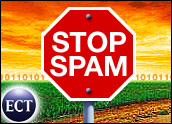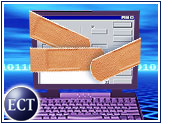
Lycos Europe yesterday announced that it has created a downloadable screensaver aimed at putting spammers out of business with distributed denial of service, or DDoS, attacks.
Available for both Mac and Windows, “Make Love, Not Spam” works by flooding a spammer’s Web site with requests for data. The theory is that a very large number of requests sent at the same time will slow response time and result in increased bandwidth costs for spammers.
Lycos says it uses a database that comprises only those Web sites using spam to promote their products. The company claims response times from targeted Web sites could decrease by as much as 85 percent. The company also says it aims for substantial slowdown — not total shutdown — which could be illegal in many countries in which the screensaver is available. Lycos Europe also said the system employs an automated feature to ensure it never completely disables any site.
Suspected spam URLs can also be reported on the “Make Love, Not Spam” Web site.Lycos Europe — which is a separate company from the similarly named Web portal in the U.S. — will offically launch the screensaver tomorrow.
Analysts Skeptical
Despite widespread media attention, some analysts said the screensaver concept is unlikely to be a sustainable, long-term solution.
“It looks a bit gimmicky to me,” said Julian Smith, online marketing and advertising analyst for Jupiter Research, Europe. “Lycos is tapping into the consumer’s irritation with spam and putting the consumer on the offensive, rather than the defensive. In reality, if Lycos can identify the source of the spam, it has a responsibility to ensure that those e-mails don’t reach the customer in the first place.
“And you have to ask, who’s paying for sending out these messages? If customers are using dial-up or other metered services, will they incur additional charges?”
Could Hurt Legitimate Sites
Another issue, Smith said, is that this could potentially be used against legitimate sites. “Even if Lycos is manually checking to verify each site, there’s always the potential for error,” she said.
“It’s not going to work,” concurred Laura Atkins, President of the SpamCon Foundation. “Spammers will start putting in garbage URLs, and most of those will belong to innocent bystanders. If it really works as Lycos says it does, spammers will use it as a harassment tool.”
Viable Solutions
Lycos Europe says it plans to protect sites from this scenario by updating its records on a daily basis. But both Smith and Atkins said a long-term fix must be more wide-ranging.
“The industry is working on solutions, such as true authentication, which will happen in the background,” noted Smith.
For example, one cooperative venture, known as the ESPC, or the Email Service Provider Coalition, is addressing spam and deliverability issues through legislative advocacy, technological development, and industry standards.
“Legal enforcement will help, too,” said Atkins. “Spammers are not scared of civil suits, but they are scared of going to jail. Most of them don’t think the risk is worth it.”
Consumer Participation
Consumers also have to play a part, she said. “People must become more knowledgeable about computers and the Internet. Spammers can turn a compromised computer into a spam source, and the computer owner may never even know it.”
In the meantime, there are concerns that the screensaver solution could backfire. “Will it escalate the battle? Will they retaliate even harder?” asked Smith. Whatever happens, said Atkins, don’t expect a quick fix.
“Spam is not going to go away,” she asserted.


















































